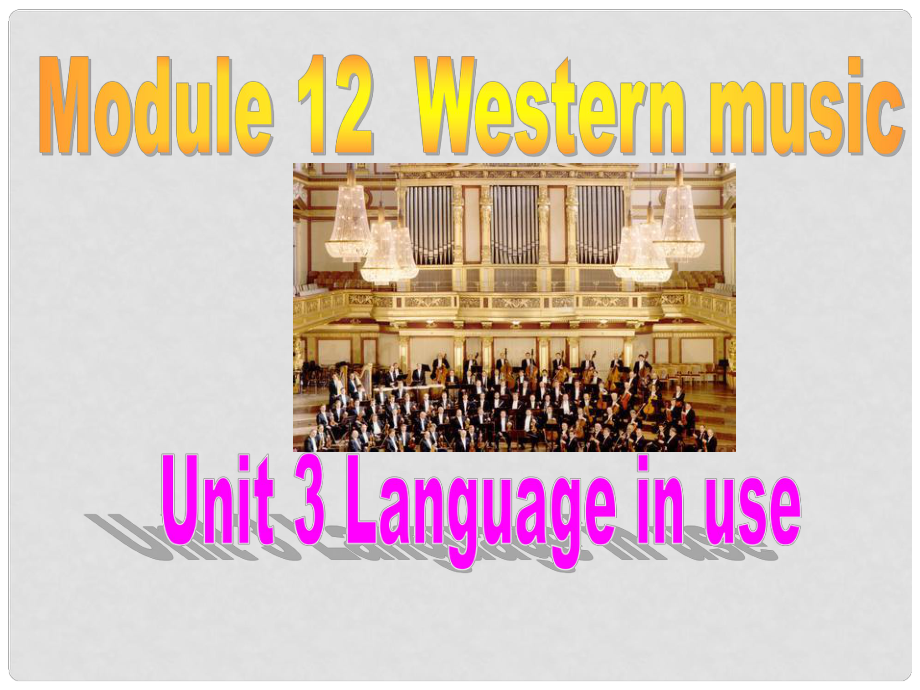《四川省華鎣市明月鎮(zhèn)七年級英語下冊 Module 12 Western music Unit 3 Language in use課件 (新版)外研版》由會員分享��,可在線閱讀�����,更多相關(guān)《四川省華鎣市明月鎮(zhèn)七年級英語下冊 Module 12 Western music Unit 3 Language in use課件 (新版)外研版(27頁珍藏版)》請?jiān)谘b配圖網(wǎng)上搜索��。
1���、What a beautiful city! Do you like traditional Western music or pop music? Is this by Strauss or Mozart? Its by Strauss. Do you like traditional Western music or pop music? Well, I like both.觀察后我們發(fā)現(xiàn)上面兩個(gè)問句中�����,提問者觀察后我們發(fā)現(xiàn)上面兩個(gè)問句中�,提問者分別給出了兩個(gè)可供對方選擇的答案。分別給出了兩個(gè)可供對方選擇的答案�����。這類在問題中提供兩個(gè)或兩個(gè)以上可選答這類在問題中提供兩個(gè)或兩個(gè)以上可選答案的問
2���、句叫案的問句叫 ���。在口語中,選擇疑問句的語調(diào)應(yīng)是第一在口語中���,選擇疑問句的語調(diào)應(yīng)是第一個(gè)選擇項(xiàng)讀個(gè)選擇項(xiàng)讀升調(diào)升調(diào)、第二個(gè)選擇項(xiàng)讀�、第二個(gè)選擇項(xiàng)讀降調(diào)降調(diào)。More examples:Is it by the father or the son?這是父親寫的還是兒子寫的��?這是父親寫的還是兒子寫的�����?Would you like coffee, tea or soda?你想喝咖啡、茶還是蘇打水�?你想喝咖啡、茶還是蘇打水�?Should I call or email you?我應(yīng)該給你打電話還是發(fā)電子郵件?我應(yīng)該給你打電話還是發(fā)電子郵件���?Did you come here by bus or by
3�、car?你是坐公交車還是開車過來的����?你是坐公交車還是開車過來的?Which does Lingling like, traditional music or pop music?玲玲喜歡傳統(tǒng)音樂還是流行音樂����?玲玲喜歡傳統(tǒng)音樂還是流行音樂?Who wrote The Blue Donube, Mozart or Strauss?誰寫的誰寫的藍(lán)色多瑙河藍(lán)色多瑙河����,莫扎特還是施特,莫扎特還是施特勞斯��?勞斯?觀察上面的句子我們可以發(fā)現(xiàn)���,選擇疑問觀察上面的句子我們可以發(fā)現(xiàn)����,選擇疑問句中句中or所連接的可以是不同的內(nèi)容�����,如兩所連接的可以是不同的內(nèi)容�����,如兩個(gè)個(gè)名詞名詞(the father or the s
4�����、on)�、兩個(gè)、兩個(gè)動詞動詞 (call or email)�、兩個(gè)、兩個(gè)介詞短語介詞短語 (by bus or by car)���、兩個(gè)、兩個(gè)專有名詞專有名詞 (Mozart or Strauss)等。等�。注意:注意:or所連接的內(nèi)容一定是所連接的內(nèi)容一定是并列的并列的,如����,如果果or的前面是名詞,其后也應(yīng)該是名詞���;的前面是名詞����,其后也應(yīng)該是名詞����;如果是動詞,則其后也必須是動詞���,不能如果是動詞��,則其后也必須是動詞����,不能前面是名詞�,后面卻接一個(gè)動詞���。前面是名詞,后面卻接一個(gè)動詞���。 you / like / pop / traditional music? Do you like pop or trad
5�、itional music?1. (be) / Strauss / German / Austrian? Is Strauss German or Austrian?2. (be) / this / pop / rock? Is this pop or rock?Write questions.3. they / play / traditional music / modern music? Do they play traditional music or modern music?4. he / play / piano / violin? Does he play piano or v
6�、iolin?5. where / (can) we / hear / rock music / in / New York / London? Where can we hear rock music, in New York or in London?在第一單元的對話中,在第一單元的對話中���,Daming 在聽到在聽到藍(lán)色多瑙河藍(lán)色多瑙河后贊嘆:后贊嘆:_! Betty 也說:也說:_! 她還贊美她還贊美維也納漂亮:維也納漂亮:_! Its so beautifulI love his musicWhat a beautiful city通過觀察���,我們發(fā)現(xiàn)這三個(gè)句子都是通過觀察,我們發(fā)現(xiàn)這三個(gè)
7��、句子都是仔細(xì)觀察這三句話:仔細(xì)觀察這三句話:Its so beautiful!I love his music!What a beautiful city!我們發(fā)現(xiàn)這些句子大致可分為兩類�����。我們發(fā)現(xiàn)這些句子大致可分為兩類����。當(dāng)我們想表達(dá)一種較為強(qiáng)烈的感情,當(dāng)我們想表達(dá)一種較為強(qiáng)烈的感情�,如喜悅�、贊嘆�����、驚異���、憤怒、厭惡等如喜悅�、贊嘆、驚異��、憤怒�、厭惡等時(shí),可以用時(shí)�����,可以用感嘆句感嘆句���。第一類:第一類:Its so beautiful!I love his music!Thats my favourite song!這類感嘆句在句式上與陳述句沒有任何區(qū)這類感嘆句在句式上與陳述句沒有任何區(qū)別����,別�����,只是將
8、句號變成了感嘆號只是將句號變成了感嘆號��,語氣變得����,語氣變得更強(qiáng)烈而已。更強(qiáng)烈而已��。這一類句子在書面語中我們用感嘆號表達(dá)這一類句子在書面語中我們用感嘆號表達(dá)感嘆的語氣���,在口語中則是通過說話的語感嘆的語氣����,在口語中則是通過說話的語氣來表達(dá)強(qiáng)烈的情感��。氣來表達(dá)強(qiáng)烈的情感����。More examples:Happy birthday, Tom!I am so angry!Ice cream is the best dessert!Ouch, that hurts!Im so excited!Thats wonderful!第二類:第二類:What a beautiful city!What a lovel
9、y day!What a horrible thing to do!這一類句子專門表達(dá)感嘆意味。這種句式這一類句子專門表達(dá)感嘆意味。這種句式常用常用what作為句子的開頭��。其基本結(jié)構(gòu)為作為句子的開頭����。其基本結(jié)構(gòu)為“What + 強(qiáng)調(diào)或感嘆的部分強(qiáng)調(diào)或感嘆的部分 (+句子的主句子的主語和謂語動詞)語和謂語動詞)”���。句子的主謂部分常常。句子的主謂部分常??梢允÷浴�?梢允÷浴ore examples:What a beautiful flower (it is)!What a lovely dog!What a big fish!What nice people (they are)!What n
10����、ice weather!What beautiful music!思考:思考:什么時(shí)候用什么時(shí)候用What a ?什么時(shí)候用什么時(shí)候用What?當(dāng)當(dāng)what后面修飾的名詞是后面修飾的名詞是可數(shù)名詞單數(shù)可數(shù)名詞單數(shù)時(shí)時(shí), what后面有不定冠詞后面有不定冠詞a; 如前三個(gè)例句。如前三個(gè)例句����。當(dāng)當(dāng)what后面修飾的名詞是后面修飾的名詞是不可數(shù)名詞不可數(shù)名詞或或可可數(shù)名詞復(fù)數(shù)數(shù)名詞復(fù)數(shù)時(shí),時(shí)�,what后面不加后面不加a。如后三�。如后三個(gè)例句。個(gè)例句�。Write exclamations with What (a)!This is beautiful music. What beautiful mus
11、ic this is!1. Vienna is a beautiful old city. What a beautiful old city Vienna is!2. It is a successful concert. What a successful concert it is!3. They are playing noisy drums. What noisy drums they are playing!4. It was a wonderful party. What a wonderful party it was!5. Mozart is a famous compose
12����、r. What a famous composer Mozart is!Put the words and expression into the correct column.drum fan musician piano pop rock traditional music violin Types of musicInstruments People pop rocktraditional music drum pianoviolinfanmusician Complete the conversation with the correct form of the words from
13����、the e give hearlearn love writeLingling: This is beautiful music. Who wrote it, Betty?Betty: Beethoven wrote it. He was a great musician. I (1) _ his music.loveLingling: Me too. Did he live at the same time as Mozart?Betty: Yes, he was born in 1770 and began to (2) _ music at an early age. He (3) _
14�����、his first piano concert when he was only seven.Lingling: When did he start to (4) _ music?writegavelearnBetty: Very early. His first work (5) _ out before the age of thirteen.Lingling: Was Beethoven famous at that time?Betty: Yes. But he began to lose his hearing. In the last ten years of Beethovens
15��、 life, he (6) _ nothing.Lingling: Thats sad!Betty: Yes, but he still played the piano. He died when he was fifty-six.cameheardVienna New Years ConcertRead the passage, tick true (T) or false (F).Vienna New Years Concert takes place on 1st January.It always includes pieces of music by Mozart.People a
16�、ll over the world enjoy the music.TFTTalking about Chinese musicTalk about one or two types of Chinese music. beautiful fast lively modern sad slow Choose one or two types of Chinese music and describe them. Use the words from the box. Say which types of music you like. Give your reasons.Now talk about Chinese music in front of the class.1. To write five exclamations with “What (a) !”2.To write five questions with “or” in them.
 四川省華鎣市明月鎮(zhèn)七年級英語下冊 Module 12 Western music Unit 3 Language in use課件 (新版)外研版
四川省華鎣市明月鎮(zhèn)七年級英語下冊 Module 12 Western music Unit 3 Language in use課件 (新版)外研版

